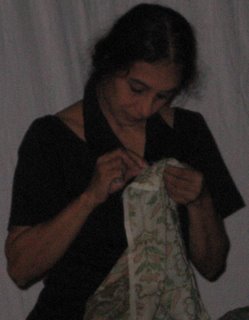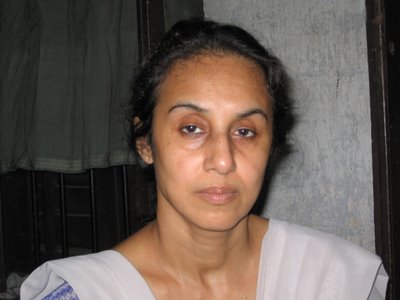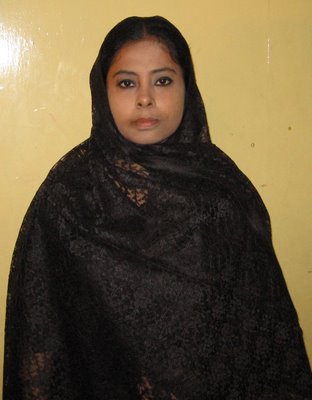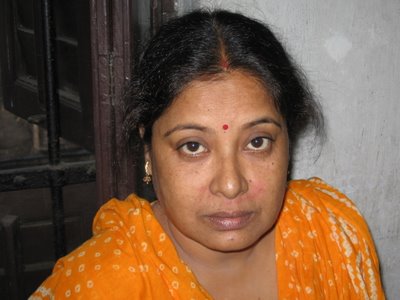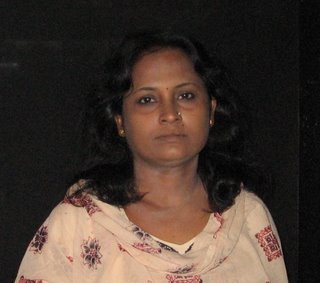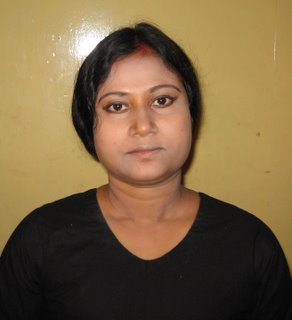
Pages to Visit
Blog Archive
-
▼
2006
(17)
-
▼
November
(15)
- Bernarda Albar Bari
- Previews/Reviews/Info
- Chaiti Choudhury - Bernarda
- Sudeshna Basu - Angustius
- Anita Roy - Martirio
- Trina Nileena Banerjee - Adela
- Sabita Raha - Poncia
- Srimoyee Majumdar - Grandmother
- Arundhati Chakraborty - Amelia
- Shukla Roy Mukherjee - Magdalena
- Raai Mukherjee - Maid
- Papiya Mukherjee - Prudencia
- Runu Ghosh - Neighbour
- Chinmoyee Sen - Neighbour
- Cast,Credits and Acknowledgements
-
▼
November
(15)
Who was the director of the Hindi film based on 'The House of Bernarda Alba"?
Thursday, November 23, 2006
Wednesday, November 22, 2006
Tuesday, November 21, 2006
Monday, November 20, 2006
Sunday, November 19, 2006
Saturday, November 18, 2006
Friday, November 17, 2006
Thursday, November 16, 2006
Wednesday, November 15, 2006
Friday, November 03, 2006
Monday, September 25, 2006
Bernarda Albar Bari – the play in Bengali
Based on
The House of Bernarda Alba
Federico Garcia Lorca's last play - "The House of Bernerda Alba" was completed just three months before his murder by anti-Republican forces. This is a story of frustrated desires, played out in the oppressive heat of Andalusia and inside the claustrophobic confinements of closed walls within the boundaries of a suffocating society, a story of suppressed passions and madness and jealousy and deceit, with the inevitable eruption of chaos and the inescapable end in death.
The play opens with the funeral of Bernarda's husband, and centres around her efforts to contain her daughters' brooding desires. The daughters exist in a cloistered household, locked in by the probing eyes of the ageing maid Poncia, by the ravings of the demented grandmother Maria, and ultimately by the tyranny of Bernarda, who deliberately forces her daughters to give up any chance at love or happiness because she believes duty and appearances require it. The daughters, already old and beyond marriageable ages because of Bernarda’s sense of superiority and class consciousness, have simple desires and wants from life. They want to go out of the oppressive walls, out into the sunshine and open fields, want to wear bright clothes and go to the village festivals, want to have a home and a husband of their own, and ultimately - desire to live a life on their own terms.
A further point of unrest is introduced in their lives when the eldest daughter Angustias, who is wealthier than her sisters as she was the daughter of Bernarda from another marriage, is proposed marriage by the most eligible young man of the village. Although it is apparent that this is a marriage of convenience, the sisters are unable to accept the fact that she will escape the prison in spite of being the least appropriate. Hatred and anger leads to jealousy and deceit and ultimately boils over in unbridled passion.
The Playwright - Federico García Lorca (1898-1936)
Federico García Lorca was born at Fuente Vaqueros, a village on the banks of the River Genil, a few miles from Granada. His father, Federico García Rodriguez, was a prosperous farmer. Vicenta Lorca Romero, García Lorca's mother, had been a schoolteacher before becoming Federico's second wife.
García Lorca first read law at the University of Granada, but later entered the University of Madrid. At the same time he also studied music. In the 1920s García Lorca collaborated with Manuel de Falla, becoming an expert pianist and guitar player. In 1919 he moved to Madrid, where he lived at the Residencia de Estudiantes, the intellectual centre of the town. His friends included the writers Juan Ramón Jiménez and Pablo Neruda, the Catalan painter Salvador Dalí and the film director Louis Buñuel.
As a writer García Lorca made his debut with LIBRO DE POEMAS (1921), a collection of fablelike poems. His first book had been a travelogue, IMPRESIONES AND PAISAJES (1918). In 1923 García Lorca earned a degree in law and turned his back to his university career.
The crucial moment in Lorca's literary career was folk music festival Fiesta de Cante Jondo in 1922, where he found inspiration for his work from the traditions of folk and gypsy music. POEMA DEL CANTE JONDO (1931, Deep Song), written already in 1921, and PRIMER ROMANCERO GITANO (1924-1927), published in 1928, made García Lorca the poet of Andalusia and its gipsy subculture. In these works he used old ballads and mythology to express his tragic vision of life. In 1926 García Lorca wrote The Shoemaker's Prodigious Wife. In 1927, García Lorca gained fame with his romantic historical play Marina Pineda, where the scenery was constructed by Salavador Dali and the distinguished actress Margarita Xirgu played the heroine. By 1928, with the publication of PRIMER ROMANCERO GITANO, he was the best-known of all Spanish poets, and leading member of the 'Generation of 27', which included Luis Cernuda, Jorge Guillen, Pedro Salinas, Rafael Alberti, and others. In 1929-30 García Lorca lived in the city of New York, on the campus of Columbia University. Unable to speak English, he suffered a deep culture shock. His suicidal mood was recorded in posthumously published POETA EN NUEVA YORK (1940, Poet in New York). The poet condemned the frightening, physically and spiritually corrupted city, and escaped to Havana to experience the harmony of a more primitive life. After a short visit to Cuba, García Lorca was back in Spain by 1931, and continued with theatre productions. He became the head the travelling theatrical company, La Barraca, which brought classical plays and other dramas to the provinces. He rebelled against the realistic theatre of the middle class. In 1933 he wrote two surrealistic dramas, EL PÚBLICO, an attack on commercial theatre and the entire social order, and ASÍ QUE PASEN CINCO AÑOS, an allegory of lost time. EL AMOR DE DON PERLIMPÍN CON BELISA EN SU JARDÍN, written in 1931, was a farce, but it also ended in death. Lorca finished the first version of the surrealistic drama EL PÚBLICO (The Audience) in 1929, but returned to it again in 1936. The play remained unpublished until the 1970s. It dealt with homosexual love, a taboo subject on the Spanish stage for many years.
Blood Wedding, the first part of García Lorca's famous trilogy, was performed in 1933. Yerma, the second part, performed in 1934, portrayed a deadly conflict in a barren marriage. The House of Bernarda Alba, written just before García Lorca's death in 1936 and published in 1945, depicted a tyrannical mother, Bernarda Alba, and her daughters.
García Lorca's central themes are love, pride, passion and violent death, which also marked his own life. The Spanish Civil began in 1936 and García Lorca was seen by the right-wing forces as an enemy. The author hid from the soldiers but he was eventually found. García Lorca was shot in Granada on August 19/20 of 1936 without trial. The circumstances of his death are still shrouded in mystery. He was buried in a grave that he had been forced to dig for himself.
Based on
The House of Bernarda Alba
Federico Garcia Lorca's last play - "The House of Bernerda Alba" was completed just three months before his murder by anti-Republican forces. This is a story of frustrated desires, played out in the oppressive heat of Andalusia and inside the claustrophobic confinements of closed walls within the boundaries of a suffocating society, a story of suppressed passions and madness and jealousy and deceit, with the inevitable eruption of chaos and the inescapable end in death.
The play opens with the funeral of Bernarda's husband, and centres around her efforts to contain her daughters' brooding desires. The daughters exist in a cloistered household, locked in by the probing eyes of the ageing maid Poncia, by the ravings of the demented grandmother Maria, and ultimately by the tyranny of Bernarda, who deliberately forces her daughters to give up any chance at love or happiness because she believes duty and appearances require it. The daughters, already old and beyond marriageable ages because of Bernarda’s sense of superiority and class consciousness, have simple desires and wants from life. They want to go out of the oppressive walls, out into the sunshine and open fields, want to wear bright clothes and go to the village festivals, want to have a home and a husband of their own, and ultimately - desire to live a life on their own terms.
A further point of unrest is introduced in their lives when the eldest daughter Angustias, who is wealthier than her sisters as she was the daughter of Bernarda from another marriage, is proposed marriage by the most eligible young man of the village. Although it is apparent that this is a marriage of convenience, the sisters are unable to accept the fact that she will escape the prison in spite of being the least appropriate. Hatred and anger leads to jealousy and deceit and ultimately boils over in unbridled passion.
The Playwright - Federico García Lorca (1898-1936)

Federico García Lorca was born at Fuente Vaqueros, a village on the banks of the River Genil, a few miles from Granada. His father, Federico García Rodriguez, was a prosperous farmer. Vicenta Lorca Romero, García Lorca's mother, had been a schoolteacher before becoming Federico's second wife.
García Lorca first read law at the University of Granada, but later entered the University of Madrid. At the same time he also studied music. In the 1920s García Lorca collaborated with Manuel de Falla, becoming an expert pianist and guitar player. In 1919 he moved to Madrid, where he lived at the Residencia de Estudiantes, the intellectual centre of the town. His friends included the writers Juan Ramón Jiménez and Pablo Neruda, the Catalan painter Salvador Dalí and the film director Louis Buñuel.
As a writer García Lorca made his debut with LIBRO DE POEMAS (1921), a collection of fablelike poems. His first book had been a travelogue, IMPRESIONES AND PAISAJES (1918). In 1923 García Lorca earned a degree in law and turned his back to his university career.
The crucial moment in Lorca's literary career was folk music festival Fiesta de Cante Jondo in 1922, where he found inspiration for his work from the traditions of folk and gypsy music. POEMA DEL CANTE JONDO (1931, Deep Song), written already in 1921, and PRIMER ROMANCERO GITANO (1924-1927), published in 1928, made García Lorca the poet of Andalusia and its gipsy subculture. In these works he used old ballads and mythology to express his tragic vision of life. In 1926 García Lorca wrote The Shoemaker's Prodigious Wife. In 1927, García Lorca gained fame with his romantic historical play Marina Pineda, where the scenery was constructed by Salavador Dali and the distinguished actress Margarita Xirgu played the heroine. By 1928, with the publication of PRIMER ROMANCERO GITANO, he was the best-known of all Spanish poets, and leading member of the 'Generation of 27', which included Luis Cernuda, Jorge Guillen, Pedro Salinas, Rafael Alberti, and others. In 1929-30 García Lorca lived in the city of New York, on the campus of Columbia University. Unable to speak English, he suffered a deep culture shock. His suicidal mood was recorded in posthumously published POETA EN NUEVA YORK (1940, Poet in New York). The poet condemned the frightening, physically and spiritually corrupted city, and escaped to Havana to experience the harmony of a more primitive life. After a short visit to Cuba, García Lorca was back in Spain by 1931, and continued with theatre productions. He became the head the travelling theatrical company, La Barraca, which brought classical plays and other dramas to the provinces. He rebelled against the realistic theatre of the middle class. In 1933 he wrote two surrealistic dramas, EL PÚBLICO, an attack on commercial theatre and the entire social order, and ASÍ QUE PASEN CINCO AÑOS, an allegory of lost time. EL AMOR DE DON PERLIMPÍN CON BELISA EN SU JARDÍN, written in 1931, was a farce, but it also ended in death. Lorca finished the first version of the surrealistic drama EL PÚBLICO (The Audience) in 1929, but returned to it again in 1936. The play remained unpublished until the 1970s. It dealt with homosexual love, a taboo subject on the Spanish stage for many years.
Blood Wedding, the first part of García Lorca's famous trilogy, was performed in 1933. Yerma, the second part, performed in 1934, portrayed a deadly conflict in a barren marriage. The House of Bernarda Alba, written just before García Lorca's death in 1936 and published in 1945, depicted a tyrannical mother, Bernarda Alba, and her daughters.
García Lorca's central themes are love, pride, passion and violent death, which also marked his own life. The Spanish Civil began in 1936 and García Lorca was seen by the right-wing forces as an enemy. The author hid from the soldiers but he was eventually found. García Lorca was shot in Granada on August 19/20 of 1936 without trial. The circumstances of his death are still shrouded in mystery. He was buried in a grave that he had been forced to dig for himself.
Thursday, March 30, 2006
The House of Bernarda Alba_rehearsals


We are rehearsing Federico Garcia Lorca's last play - "The House of Bernerda Alba". Lorca completed this play just three months before his murder by anti-Republican forces. This is a story of frustrated desires, played out in the oppressive heat of Andalusia and inside the claustrophobic confinements of closed walls within the boundaries of a suffocating society, a story of suppressed passions and madness and jealousy and deceit, with the inevitable eruption of chaos and the inescapable end in death .............
Subscribe to:
Comments (Atom)
About Me

- Theatron
- We’ve always chosen plays that are beyond our means. If we want to define the character of our group, that single sentence should do it. We have remained around for over 30 years now, in Kolkata, the cultural capital of India, and we have survived despite our dogmatic stand. We are part of Theatron. We are part of a group that has never gone for numbers, that has always measured success by the aesthetic standards it has been able to set, and the extent to which it has been able to enthral and captivate and touch the people. The group was formed in April, 1974.



